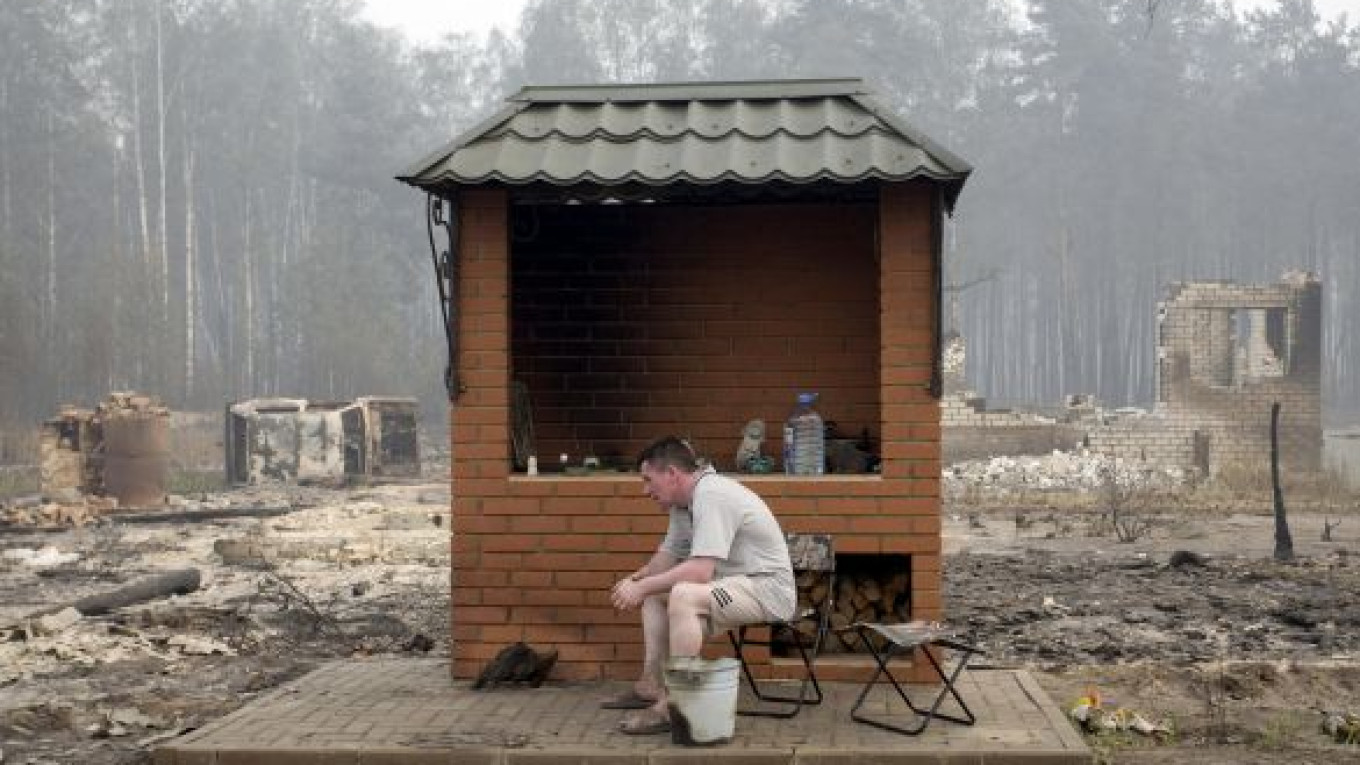Firefighters scored a small victory in their battle against wildfires Sunday when they finally put out blazes that had threatened the Sarov nuclear research center.
But wildfires continued to ravage other areas, and the opposition accused authorities of being in denial.
Soldiers dug an eight-kilometer canal to keep fires away from Sarov, ringed by forest in the Nizhny Novgorod region, before the fires were finally extinguished Sunday, emergency officials said.
On Friday, firefighters had to extinguish two blazes inside the perimeter of the city.
Sarov is a closed town whose nuclear site produced the first Soviet atomic bomb in 1949 and remains the main nuclear design and production facility in Russia.
Rosatom chief Sergei Kiriyenko had assured President Dmitry Medvedev on Thursday that all explosive and radioactive material had been removed from the nuclear site as a precautionary measure.
Forest and peat fires caused by the hottest weather ever recorded have killed at least 52 people in central Russia and left more than 4,000 homeless. The most difficult fire situations were in the Moscow, Nizhny Novgorod and Kirov regions, the Emergency Situations Ministry said Sunday.
The opposition Yabloko party on Sunday accused Nizhny Novgorod Governor Valery Shantsev of deliberately denying residents access to information on the fires raging in his region by not reinstating the web site Wyksa.ru, which was shut on Thursday in a cyber attack.
The web site had served as a lifeline for residents by giving detailed information on how to get help, Yabloko said in a statement, adding that its closure "killed people."
Meanwhile, Natural Resources Minister Yury Trenev said Friday that there was no water shortage yet despite the heat wave because officials had kept reservoir levels high. But he noted that river levels are down by more than 20 percent because of increased demands for water to battle the fires and practically no water flowing in.
France, responding to a plea from Russia for aid, offered 120 men, 37 vehicles, 15 motorpumps and a bombardier DASH water plane, the French presidential administration said in a statement Sunday. Italy and several other countries have sent help already.
President Dmitry Medvedev donated 350,000 rubles ($12,000) of his own cash to help the fire victims, local media reported — equal to about two years' wages for an average Russian but enough to cover only one-sixth of the cost of rebuilding a burned-down home. He urged other officials to chip in as well.
(MT, Reuters)
A blogger who got a fire bell from Prime Minister Vladimir Putin last week in response to a profanity-laden post accusing the authorities of negligence in the fires told Ekho Moskvy radio on Saturday that the government needed to do more than provide bells to prevent fires.
The blogger, whom the radio station only identified as Alexander, said the state should invest money in firetrucks and other fire-safety measures.
Komsomolskaya Pravda identified the blogger as Alexander Pochkov, 28, a resident of southern Moscow.
A Message from The Moscow Times:
Dear readers,
We are facing unprecedented challenges. Russia's Prosecutor General's Office has designated The Moscow Times as an "undesirable" organization, criminalizing our work and putting our staff at risk of prosecution. This follows our earlier unjust labeling as a "foreign agent."
These actions are direct attempts to silence independent journalism in Russia. The authorities claim our work "discredits the decisions of the Russian leadership." We see things differently: we strive to provide accurate, unbiased reporting on Russia.
We, the journalists of The Moscow Times, refuse to be silenced. But to continue our work, we need your help.
Your support, no matter how small, makes a world of difference. If you can, please support us monthly starting from just $2. It's quick to set up, and every contribution makes a significant impact.
By supporting The Moscow Times, you're defending open, independent journalism in the face of repression. Thank you for standing with us.
Remind me later.


